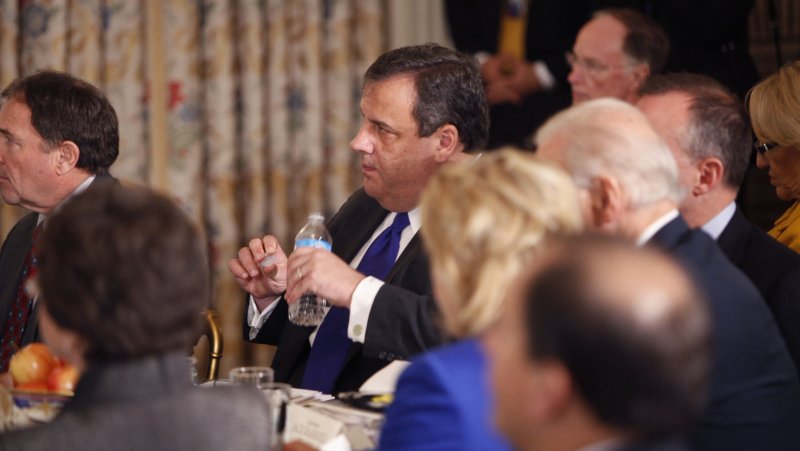Governor Chris Christie, NJ, listens to President Barack Obama speak to the National Governors Association in the State Dining room of the White House on February 25, 2013 in Washington, DC. UPI/Dennis Brack/Pool |
License Photo
TRENTON, N.J., Feb. 27 (UPI) -- Gov. Chris Christie, a sharp critic of President Barack Obama's healthcare law, says he wants New Jersey to get federal dollars to expand Medicaid after all.
"Accepting these federal resources will provide health insurance to tens of thousand of low-income New Jerseyans, help keep our hospitals financially healthy and actually save money for New Jersey taxpayers," the prominent Republican said in his annual budget address.
His decision makes him the eighth GOP governor to back expanding Medicaid through the Patient Protection and Affordable Care Act.
The act's optional Medicaid portion is expected to let 104,000 to 300,000 of New Jersey's poorest 1.3 million residents get health insurance. It would save the state $227 million next fiscal year alone, Christie said.
The U.S. Supreme Court ruled last June the law was constitutional but said states could choose not to expand their Medicaid programs under it.
Christie said in making his decision he looked at the financial benefit to the state.
Medicaid is normally jointly financed by the federal government and the states, but the optional Medicaid-expansion costs will be paid totally by Washington for three years before it cuts back to 90 percent over a number of years.
Christie said he also looked at the practicalities of rejecting Medicaid expansion.
"Refusing these federal dollars does not mean that they won't be spent," Christie said. "It just means that they will be used to expand healthcare access in New York, Connecticut, Ohio or somewhere else."
While he said he would embrace that part of President Barack Obama's signature legislative accomplishment, he said he still doesn't like the law.
"Let me be clear -- I am no fan of the Affordable Care Act," Christie said. "I think it is wrong for New Jersey and for America. I fought against it and believe, in the long run, it will not achieve what it promises. However, it is now the law of the land. I will make all my judgments as governor based on what is best for New Jerseyans."
In illustrating his dislike for the health-reform law, he pointed to his refusal to have the state set up health-insurance exchanges.
"I twice vetoed saddling our taxpayers with the untold burden of establishing health exchanges," he said.
The exchanges are government-regulated and -standardized healthcare plans people can choose from for subsidized health insurance. All exchanges must be fully certified and operational by Jan. 1, 2014.
Christie's announcement came six days after Republican Florida Gov. Rick Scot, another strident critic of Obama's healthcare law did a U-turn and said Florida should accept federal money to expand Medicaid coverage in the state.
Scot vowed last July never to implement the optional Medicaid portion.
Michigan Gov. Rick Snyder, Ohio Gov. John Kasich and Arizona Gov. Jan Brewer are also among the formerly critical governors now embracing the key pillar of Obama's healthcare law.
Twenty-four states and the District of Columbia are now on board, and 16 others are deliberating. The remaining 10, all with Republican governors, have said no -- - but The Washington Post said observers believe some of them could change their minds.
Obama's healthcare law expands Medicaid eligibility to families with incomes at 133 percent of the poverty level.
Half the 30 million Americans nationwide expected to gain health insurance through the Affordable Care Act will do so by moving onto Medicaid, beginning Jan. 1.
Medicaid is the nation's largest health program, providing medical services to 56 million people with low incomes and disabilities, while also providing nursing-home aid to elderly people.















